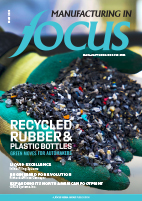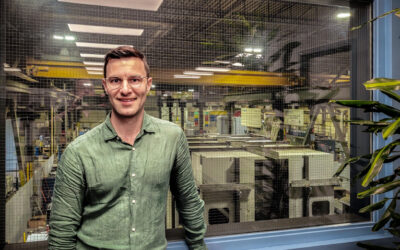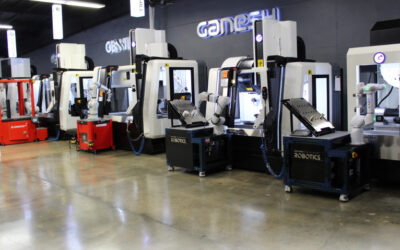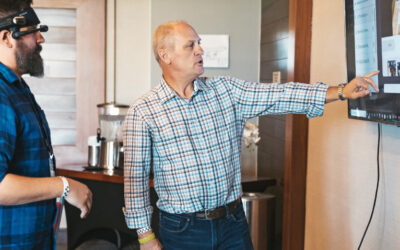Big things are happening at Apex Industries in Tigard, Oregon. The precision plastics manufacturer has boosted its workforce, invested heavily in equipment and technology, designed its own internal enterprise resource planning (ERP) system, and introduced its own products. The company can handle design, prototyping, and production work for applications involving semiconductor processes, fluid distribution, and chemical management and containment.
~
“We are an amalgam of six different types of services. We do the standard contract manufacturing, build-to-order that others do, but at the same time, we like to think of ourselves as vertically-integrated and structured. We can work with customers at an engineering level. We can help them decide how they want to approach a design and give them valuable feedback in terms of material selection and what the weld structures might need to look like for the project,” says Sales Marketing and Business Development Manager Jason Shostrand.
Other Apex services include fabrication, welding, and precision machining. The firm has over twenty computer numerical control (CNC) machines at its disposal and is just adding another.
“We consider ourselves a plastics welding expert because of the degree and depth of plastics material we’re able to reliably weld,” says Shostrand. “The sixth type of service we offer is integration,” he continues, noting that Apex has “two Class 1000 clean rooms in which we perform high purity PFA tube bending, socket fusion, IR welding, and Entegris PureBond* for plumbing solutions that accommodate various integrated assemblies and weldments. Our integration services also include electromechanical work involving various plastic components and sub-assemblies.” Apex is a UL 508A certified panel shop.
“We can really offer a full level of services to help a customer from concept to production shipment on a product,” notes Shostrand, proudly.
Apex Industries has also recently launched its own product line, designed for managing chemicals in the semiconductor sector. These products include patent-pending Freyr™ LED Light Strips, a lighting system for harsh work environments. This system was developed for workplaces where lighting might be affected by chemicals, solvents, acids, or gases.
Other new products that were developed in-house include the Gemini™ Barrel Cabinet System for containing and managing chemicals and the Lyra™ Valve Box. “We’re now pushing out some standard products. These are products we’ve built hundreds of over the years for customers, but we’ve never really had an identity around them that was Apex,” Shostrand states.
Apex has worked for a huge number of industries, from aerospace to electronics, chemicals, industrial facilities and waste treatment. Of these, the biggest revenue generator would be the semiconductor industry and the adjacent chemical and fluid management and distribution sector. The latter involves “the solutions, solvents, and chemicals used in semiconductor processes that come from chemical distribution plants,” explains Shostrand.
“We are diversifying quite a bit in the industries that we service. We’re finding that there are lots of different applications for various forms of plastics,” he adds.
The company has also been picking up plenty of work as of late. Apex currently has slightly more than 120 employees up from roughly one hundred earlier this year, according to Shostrand. “The industries we serve have cycled up in terms of overall capacity. We’ve had to accommodate the growth of some very large customers of ours,” he explains. Of the current employees, ten are engineering focused.
The leap in personnel has been accompanied by big investments in technology and equipment. The company just recently installed a Grob G551 machining center and is preparing to install a Haas ST-35Y CNC lathe. “The investments we’ve made over the last two years are what separate us from a lot of other companies. Last year, we probably spent three-quarters of a million dollars. We continue to invest to make sure our company is able to offer a competitive service. Our approach to solving problems is to use innovation and technology. This year, with the new machines and training, we’ll spend well over $2 million. These are very large numbers for a company our size,” says Shostrand.
“From a technology standpoint, we’re stepping up our game with our new multi-axis Machine investments with a Grob G551 5-axis mill and Haas ST-35Y lathe with live tooling. These machines give us a competitive edge in machining capabilities. By leaning on the strengths of our new machines, we strive to create repeatable and robust processes enabling us to establish automated solutions, minimizing operations and increasing accuracy,” adds Fabrication and Machine Shop Manager Josh Powell.
Apex is keen to stay ahead of the technological curve; in addition to CNC machines, the company utilizes computer-aided design (CAD) and computer-aided manufacturing (CAM) software and developed its own ERP system to simplify quoting procedures.
“The ERP process we’ve established for quoting allows [all departments] to see the same information” which helps speed production and delivery, Powell says.
The ultimate aim of the new machinery and technology is to do “lights out” production using a PSS-R10 Palette System, something the company is targeting for the end of this year. “Lights out” manufacturing refers to fully-automated factories that, because they require no human at the facility, could be run with the lights out. In keeping with this goal, the company always keeps “an eye on technology that could be advantageous to adopt,” Shostrand says.
Apex Industries was founded in 1997 by Mike Strand, who remains owner and president today. At first, the main focus of the firm was on making plastic components and parts for clients in the technological fields. Over the years, Apex’s product line and the markets it served expanded.
All of the company’s operations are consolidated in Tigard, Oregon. It has considered adding branches but so far, “we’ve been able to adequately service all of our customers from this location [in a timely manner],” says Shostrand. “Most of our customers are in the west, but we are multinational. We service customers all over the United States, and we have customers outside the United States as well, given the large footprint of semiconductor manufacturers and Tool OEMs,” he adds.
He says the company’s biggest challenge right now is “accommodating the growth needs of the industries we serve. It’s difficult for companies our size to quickly find skilled labor that we can plug into our culture, environment and processes. We look for a fit in all aspects. Sometimes finding that fit requires us to go through sixty people. Maybe twenty of them will fit our requirements. Within that, you get five [new hires].”
These new hires preferably “have capabilities that can help us to grow in areas we may not have historically had experience in,” says Powell. The firm wants workers who understand that quality and on-time delivery are central to the company’s mission. New hires need also need to be aware that “in the industries we serve, precision is a core tenet,” adds Shostrand.
According to Powell, plastic fabrication is not typically taught in trade schools, which means Apex frequently has to look to other industries to find new workers. The firm emphasizes cross-training to build teamwork and a problem-solving mentality and works to develop workers with multiple skill sets.
The corporate culture at Apex Industries is built around open discussion and “something of a family atmosphere,” says Powell. “My observation has been this is a company with employees that take great pride in the services they provide. They’re inherent problem-solvers that really enjoy helping out customers,” adds Shostrand.
Apex is ISO 9001:2015 certified and has vigorous quality assurance procedures such as Copy Exactly. The company gets audited on a regular basis and has an experienced quality manager who runs a team charged with ensuring that quality levels remain at ISO standards. It also recently hired a new technical writer who is able to assist in documenting quality issues and writing reports.
Hand-in-hand with quality comes safety. The firm has a safety team, monthly safety meetings and regular toolbox training sessions which incorporate safety messages. “We have OSHA [Occupational Safety and Health Administration] officials come in and help audit the facility and look for areas to improve,” notes Powell.
Improvement is a major theme at Apex. The company runs a continuous improvement team which has been given the task of reviewing projects and figuring out ways to do things better.
As for vendors, Apex has “developed a strong network of supplier partners who are very familiar with our needs. They understand what we look for in terms of components and capabilities. We work with great partners across the board,” states Shostrand.
This July, Apex participated in SEMICON West, a trade conference for the electronics supply chain, in San Francisco. Apex has grown almost exclusively through customer referrals for two decades, and SEMICON was a step toward making its capabilities more accessible to companies outside that organic network – a move from best kept secret to industry resource. In addition to attending trade shows, the firm promotes itself with an online presence. “We’re amping up the way we communicate with our customers,” adds Shostrand. Apex used its SEMICON appearance to announce its new, custom products.
With these new products and boosted industry presence, Shostrand sees a bright future. “We hope to have a very diverse, healthy customer base,” he says of the company’s plans for five years from now. “Obviously, we’d like to grow our revenue. We want to be adding to our family, bring more folks in from the local community, and give them great jobs.”













